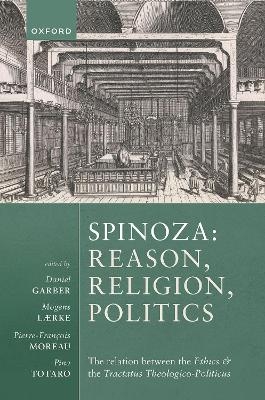
Spinoza: Reason, Religion, Politics
Oxford University Press (Verlag)
978-0-19-884816-5 (ISBN)
At his death, Spinoza left two major works, very different from one another. The first is the Ethics, rigorously set out in geometrical terms, with definitions, axioms, and theorems. In the Ethics, Spinoza takes the reader down the path of reason to an ultimate beatitude, a rational salvation, a kind of peace of mind attained through the true knowledge of God, oneself, and one's place in the world. The other is of a very different sort. The Tractatus theologico-politicus is set out in twenty chapters. It begins with a discussion of prophecy and revelation, followed by a detailed description of Scripture, and what we can learn from it, the message of scripture. And that message is to be obedient to God, and to love our neighbours as ourselves.
Two books, two styles of argument, two very different paths to salvation, arguably two Gods and arguably two very different kinds of kinds of salvation at the end. But one author. The challenge is evident: how do these books fit together? One is about reason, the other about revelation, one is about personal salvation, the other more focused on how we live together. Spinoza's writing has always drawn strong reactions, both positive and negative: he was accepted by some as a kind of secular prophet offering us a guide to life, and rejected by others as a kind of atheist and heretic. In this book, a diverse international group of seventeen scholars confronts these two central works in the philosophical canon, and explores what Spinoza is trying to tell us about life, the world, and our place in it.
Daniel Garber received his Ph.D. in Philosophy from Harvard University in 1975. He was a member of the Department of Philosophy at the University of Chicago from 1975 until 2002, when he moved to Princeton University. Garber currently is the A. Watson Armour III University Professor of Philosophy at Princeton, and Affiliated Faculty in History of Science and Politics. He is the author of Descartes' Metaphysical Physics and Leibniz: Body, Substance, Monad, among other books and edited collections. Mogens Lærke is Senior Researcher at the Centre National de la Recherche Scientifique (CNRS) and a Senior Associate of Pembroke College, Oxford. Before joining the CNRS in 2013, he held positions at the Carlsberg Foundation, Tel Aviv University, the University of Chicago, and the University of Aberdeen. He is the Series Editor of the BSHP New Texts in the History of Philosophy series (OUP). Pierre François Moreau is Emeritus Professor at the École Normale Supérieure de Lyon, where he was Professor of Philosophy from 1992 to 2016. He has written extensively on Lucretius, Hobbes, Spinoza, utopian novels and nineteenth-century French Philosophy. Moreau is the Director of the journal La lettre clandestine, dedicated to clandestine manuscripts and to libertine, heterodox, and materialist authors. Pina Totaro is a Director of Research at the Italian Consiglio Nazionale delle Richerche (CNR), a member of the Istituto per il Lessico Intellettuale Europeo e Storia delle Idee (ILIESI) in Rome, and a certified professor in the History of Philosophy. Her scholarly interests are in the history of philosophy, Cartesianism, the philosophy of Spinoza and the history of Spinozism.
Abbreviations
Introduction
Part One: Two Intertwined Texts
1: Piet Steenbakkers: Parallel Masterpieces: Intertextuality in Spinoza's Ethics and Tractatus Theologico-Politicus
2: Pina Totaro: Continuity and Discontinuity Between the Tractatus Theologico-Politicus and the Ethics
3: Steven Nadler: Spinoza's 'Atheism', the Ethics and the Tractatus Theologico-Politicus
Part Two: God and Atheism
4: Mogens Lærke: Prejudices, Common Notions, Intuitions: Knowledge of God between the Ethics and the Tractatus Theologico-Politicus
5: Yitzhak Y. Melamed: Spinoza's 'Atheism', the Ethics and the Tractatus Theologico-Politicus
Part Three: Laws: Natural, Human, and Divine
6: E.M Curley: Descartes and Spinoza on the Laws of Nature
7: Theo Verbeek: Divine Law in Spinoza's Tractatus Theologico-Politicus
8: Donald Rutherford: Divine Law and the Right Way of Living: From the Tractatus Theologico-Politicus to the Ethics
Part Four: Wonder, Final Causes, and Miracles
9: Andrea Sangiacomo: Is Wonder a Remedy against the Passions? Spinoza's Struggle with Descartes's Legacy in the Tractatus Theologico-Politicus and in the Ethics
10: Emanuela Scribano: Finalism, Religion, and Miracles: From the Tractatus Theologico-Politicus to the Ethics
Part Five: Revelation, Reason, and Salvation
11: Ursula Renz and Philip Waldner: Spinoza's Views on Prophecy and the Prophets Revisited
12: Daniel Garber: Philosophy and Theology, Reason and Revelation: the Ethics and the Tractatus Theologico-Politicus
13: Russ Leo: Reason and Scripture in the Ethics and Tractatus Theologico-Politicus: Jarig Jelles and Preface to the Nagelate schriften van B.D.S (1677)
14: Kristin Primus: Finding Oneself in God: Scientia Intuitiva as a Metaphysically Self-Locating Thought
15: Julie Klein: How to Make a Philosopher
Part Six: Political Philosophy
16: Michael Rosenthal: Will, Sovereignty, and the Self in the Ethics and the Tractatus Theologico-Politicus
17: Jonathan Israel: Where is the Collective Morality in Spinoza's Ethics? Connecting Spinoza's Ethics to his Political Philosophy
| Erscheinungsdatum | 05.09.2024 |
|---|---|
| Verlagsort | Oxford |
| Sprache | englisch |
| Maße | 164 x 240 mm |
| Gewicht | 868 g |
| Themenwelt | Geisteswissenschaften ► Philosophie ► Philosophie der Neuzeit |
| Geisteswissenschaften ► Religion / Theologie | |
| ISBN-10 | 0-19-884816-1 / 0198848161 |
| ISBN-13 | 978-0-19-884816-5 / 9780198848165 |
| Zustand | Neuware |
| Informationen gemäß Produktsicherheitsverordnung (GPSR) | |
| Haben Sie eine Frage zum Produkt? |
aus dem Bereich


